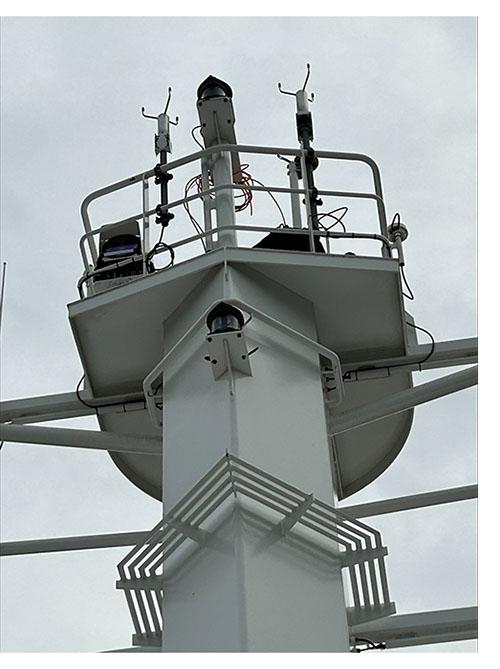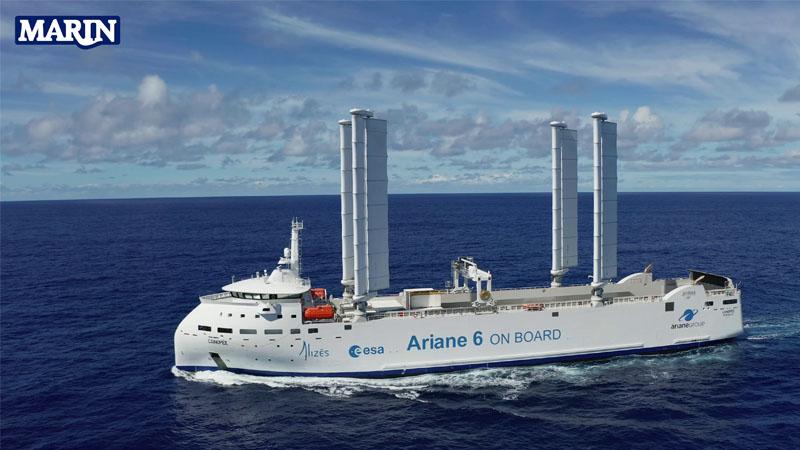Optimizing wind-assisted shipping with precise wind measurements
The client: Maritime Research Institute Netherlands (MARIN)
Vaisala solution: WindCube® Nacelle, WINDCAP® Ultrasonic Wind Sensor WMT700
Wind-assisted ship propulsion (WASP) is a promising method of harnessing the wind to reduce the use of fuel and is a key technology in the future of clean maritime shipping. MARIN, the Maritime Research Institute Netherlands, is the leading maritime institute at the forefront of this movement. Among their research and full-scale monitoring capabilities, MARIN conducts in- service performance tests for new ships including WASP-enabled vessels. Their services result in cleaner, safer and smarter ships and operations.
THE CHALLENGE: An accurate sea test for an advanced vessel
Canopée, a wind-assisted ship built for Zephyr & Borée, is a big step for sustainable maritime transport: It's the world's first hybrid industrial cargo ship with Oceanwings® wingsails. Canopée was created to carry rocket parts from Europe to French Guiana in 11 expected round trips per year, and the wingsails help cut average annual fuel use by about 35%.
MARIN was tasked with conducting a sea trial which involved assessing the WASP system's capability to utilize wind power for efficient propulsion, as well as measuring energy savings and fuel reduction. Accurate, reliable wind and weather sensing technology plays a critical role in helping to ensure wind-assisted propulsion is harnessed to its fullest potential.
Gathering and examining undisturbed wind data while tracking the vessel's performance in various wind conditions was crucial for determining the most effective wind angles and speeds for optimal efficiency.

THE APPROACH: World-class wind measurement technology
MARIN selected the Vaisala WindCube Nacelle wind lidar together with two Vaisala WINDCAP® Ultrasonic Wind Sensor WMT700s for performance testing. WindCube Nacelle horizontal profiling lidar provides high-precision wind data with real-time delivery and analysis for unparalleled performance optimization. It is ideal for performance testing, measuring undisturbed wind that is not affected by ship structures or the WASP system.
The robust and reliable WMT700 provides surface wind direction and wind speed measurement that is WMO, CIMO, and ICAO compliant. It delivers highly accurate information from barely perceptible winds to extremely high gusts — even in the harshest maritime conditions.
With the lidar and sensors installed on Canopée, MARIN conducted the sea trial from September to December 2023, ensuring the integration and success of this technology. With their detailed analysis and comparison of wind data, MARIN provided recommendations for optimizing sail usage based on measured environmental conditions.
THE RESULTS: Accurate system optimization for performance and efficiency
With highly accurate wind data, MARIN made specific recommendations to enhance Oceanwings performance. These improvements not only boost performance but also enhance fuel efficiency, reduce fuel costs, and lower greenhouse gas emissions.
MARIN chose Vaisala technology for its reliable and accurate environmental measurement solutions across maritime applications, with WindCube Nacelle being the perfect choice for optimizing Canopée’s wind-assisted propulsion system. Precise wind measurements also enabled better route planning, maximizing the vessel’s efficiency and sustainability. MARIN effectively utilized wind data during sea trials, showcasing the importance of integrating advanced research and technology in maritime operations.
"Accurate, undisturbed wind data from the WindCube Nacelle lidar was essential for optimizing Canopée's wind-assisted propulsion system, significantly improving our understanding of real-time wind conditions onboard the vessel." - Gijs Struijk, On Board Specialist, MARIN
Why Vaisala?
Weather and environmental insights are the greatest catalysts for successful maritime operations— from sensors to systems and digital services, Vaisala provides actionable insights that empower stakeholders to confidently meet challenges and harness new opportunities. Our globally trusted maritime weather solutions enable remarkable efficiency gains, digital transformation, the protection of people and investments while supporting sustainable and responsible operations.
We are scientists and explorers driven by passion, relentless curiosity, and the desire to create a better world. Backed by nearly 90 years of unmatched scientific leadership, our solutions increase maritime weather awareness and drive innovation.


